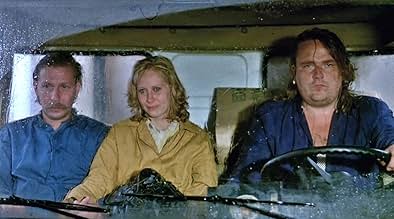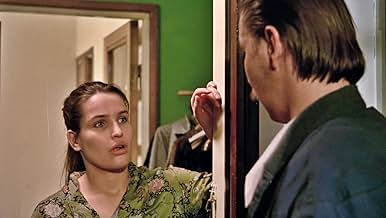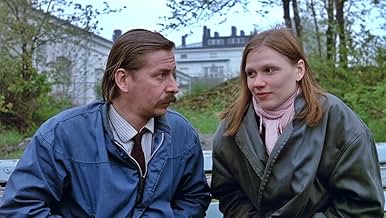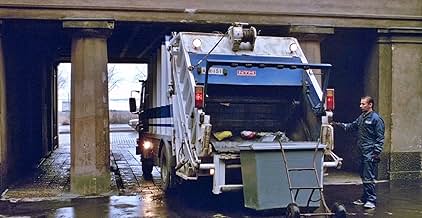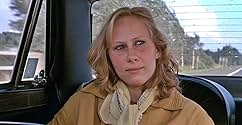IMDb RATING
7.4/10
8.1K
YOUR RATING
An episode in the life of Nikander, a garbage man, involving the death of a coworker, a love affair and much more.An episode in the life of Nikander, a garbage man, involving the death of a coworker, a love affair and much more.An episode in the life of Nikander, a garbage man, involving the death of a coworker, a love affair and much more.
- Awards
- 1 win total
Safka Pekkonen
- Pianist
- (as Safka)
Mato Valtonen
- Pelle
- (as Markku Valtonen)
Sakke Järvenpää
- Staffan
- (as Sakari Järvenpää)
- Director
- Writer
- All cast & crew
- Production, box office & more at IMDbPro
Featured reviews
After a stunning debut, Crime and Punishment, and a bizarre, experimental second feature, Calamari Union, Aki Kaurismäki began doing what he's best at: telling the stories of Finnish underdogs'everyday experiences. And it all started with Shadows in Paradise, the first installment of the "workers trilogy" (continued with Ariel and The Match Factory Girl), and arguably Kaurismäki's finest film (at least until he made The Man Without a Past). It also marked his first collaboration with Kati Outinen, who has become the very symbol, alongside the late Matti Pellonpää, of Kaurismäki's cinema.
Fittingly, Pellonpää and Outinen are the leading couple of shadows in Paradise. He reprises the role of Nikander he previously played in Crime and Punishment, with more English lessons (which originate his best line, at the end of the film) and trouble at work: his plans to start his own business get buried with his associate (Esko Nikkari), who commits suicide five minutes into the movie. While looking for a new job, he meets Ilona (Outinen), who works as a cashier in a Helsinki supermarket. The two start hanging out, eventually forming a sweet, if platonic, bond, occasionally threatened by Nikander's apparent cynicism.
The film's magic resides entirely in its minimalism: little dialogue, sober settings, raw, Finnish humor, real, likable characters and no overacting, as Kaurismäki tells his simple, universal, incredibly touching love story. Pellonpää and Outinen's understated, affecting performances complete each other, with valuable support from Sakari Kuosmanen as Melartin, Nikander's best friend, who even steals from his own daughter to finance his buddy's dates. Not that his behavior is exemplary, but it shows how much these people care for each other, and that's where Kaurismäki succeeds: he makes us emphasize with these characters despite their many flaws, and delivers an astounding, memorable picture.
A true masterpiece of Finnish film-making, from the best director that country has ever spawned.
Fittingly, Pellonpää and Outinen are the leading couple of shadows in Paradise. He reprises the role of Nikander he previously played in Crime and Punishment, with more English lessons (which originate his best line, at the end of the film) and trouble at work: his plans to start his own business get buried with his associate (Esko Nikkari), who commits suicide five minutes into the movie. While looking for a new job, he meets Ilona (Outinen), who works as a cashier in a Helsinki supermarket. The two start hanging out, eventually forming a sweet, if platonic, bond, occasionally threatened by Nikander's apparent cynicism.
The film's magic resides entirely in its minimalism: little dialogue, sober settings, raw, Finnish humor, real, likable characters and no overacting, as Kaurismäki tells his simple, universal, incredibly touching love story. Pellonpää and Outinen's understated, affecting performances complete each other, with valuable support from Sakari Kuosmanen as Melartin, Nikander's best friend, who even steals from his own daughter to finance his buddy's dates. Not that his behavior is exemplary, but it shows how much these people care for each other, and that's where Kaurismäki succeeds: he makes us emphasize with these characters despite their many flaws, and delivers an astounding, memorable picture.
A true masterpiece of Finnish film-making, from the best director that country has ever spawned.
There's an almost silent film like quality to much of Kaurismäki's work, with that notion of a cinema of images that works without the extraneous use of dialogue or the broader notions of exposition. What this results in is a style of film-making in which the most simple of images tells a story. Simplicity is essentially the key to this film; not simply within the set up, in which a bin man begins a furtive relationship with a supermarket checkout girl, but in the presentation of the film itself. Some critics have used worlds like minimalist or unassuming when discussing the films of Kaurismäki, and in particular, his early trilogy of films, of which Shadows in Paradise (1986) would be the first, but to me, it's more about simplification; stripping away all the usual narrative window-dressing and over complicated presentation of technique to get to the very centre of the story and the heart of these characters.
This was Kaurismäki's third film as a director, though at times you could argue that it feels more like his first. His actual debut came with Crime and Punishment (1983), a typically straight-faced adaptation of the classic Dostoevsky novel, with the more obvious Kaurismäki touches at this point still being in the somewhat embryonic stages. This was followed by the oddly surreal and coolly episodic Calamari Union (1985), a bizarre black and white comedy that drew on the influence of Bertrand Blier's Buffet Froid (1979) to tell the story of fifteen men - fourteen of them named Frank Merciless, and an idiot man-child named Pekka - who leave behind the hopeless working class district of Eira and quest to the near-mythical suburb of Kallio. These films are somewhat ambitious, both in terms of their narrative scope and the technical presentation, suggesting the work of a filmmaker already fairly confident about what cinema is and what his cinema should accomplish. In comparison, Shadows in Paradise seems content to tell an honest story about small, everyday characters in such a way as to not draw too much attention to itself.
There's nothing wrong with that. There is a pure art to the presentation of subtlety - something that Kaurismäki is well aware of - and although I tend to prefer his more inventive and idiosyncratic films, such as the aforementioned Calamari Union, as well as the far greater films like Hamlet Goes Business (1987), Ariel (1988) and The Man Without a Past (2003), there is something quite commendable about a film that attempts to work on such a honest and simple level. The relationship between the characters here is something most of us can identify with, as the odd relationship between Nikander and Ilona propels the story, which is further grounded by Nikander's friendships with his co-workers, Esko and Melartin. As even with Kaurismäki the film works as a result of the perfect casting, with Matti Pellonpää, Kati Outinen, Sakari Kuosmanen and Esko Nikkari, all regulars of the director's work, managing to give so much information about the lives of these characters with gestures so small and exchanges so subtle as to be completely lost on a less attentive audience.
For me, Shadows in Paradise isn't the greatest of Kaurismäki's films, or indeed, the best place to start. However, it does show hints of the style that would be further developed, not least in the two films that would continue and close this loose, thematic trilogy, Ariel and The Match Factory Girl (1990), but in far more ambitious and imaginative projects like Leningrad Cowboys Go America (1989), Drifting Clouds (1994) and Lights in the Dusk (2006). That said, Shadows in Paradise does offer the usual high quality of performance and direction, with the typical Kaurismäki approach to low-key production design and warm cinematography. If you're already familiar with the director's later films then Shadows in Paradise is certainly worth seeking out, if only for the chance to see the formation of that unique style and the soon to be recognisable approach to character and narrative.
This was Kaurismäki's third film as a director, though at times you could argue that it feels more like his first. His actual debut came with Crime and Punishment (1983), a typically straight-faced adaptation of the classic Dostoevsky novel, with the more obvious Kaurismäki touches at this point still being in the somewhat embryonic stages. This was followed by the oddly surreal and coolly episodic Calamari Union (1985), a bizarre black and white comedy that drew on the influence of Bertrand Blier's Buffet Froid (1979) to tell the story of fifteen men - fourteen of them named Frank Merciless, and an idiot man-child named Pekka - who leave behind the hopeless working class district of Eira and quest to the near-mythical suburb of Kallio. These films are somewhat ambitious, both in terms of their narrative scope and the technical presentation, suggesting the work of a filmmaker already fairly confident about what cinema is and what his cinema should accomplish. In comparison, Shadows in Paradise seems content to tell an honest story about small, everyday characters in such a way as to not draw too much attention to itself.
There's nothing wrong with that. There is a pure art to the presentation of subtlety - something that Kaurismäki is well aware of - and although I tend to prefer his more inventive and idiosyncratic films, such as the aforementioned Calamari Union, as well as the far greater films like Hamlet Goes Business (1987), Ariel (1988) and The Man Without a Past (2003), there is something quite commendable about a film that attempts to work on such a honest and simple level. The relationship between the characters here is something most of us can identify with, as the odd relationship between Nikander and Ilona propels the story, which is further grounded by Nikander's friendships with his co-workers, Esko and Melartin. As even with Kaurismäki the film works as a result of the perfect casting, with Matti Pellonpää, Kati Outinen, Sakari Kuosmanen and Esko Nikkari, all regulars of the director's work, managing to give so much information about the lives of these characters with gestures so small and exchanges so subtle as to be completely lost on a less attentive audience.
For me, Shadows in Paradise isn't the greatest of Kaurismäki's films, or indeed, the best place to start. However, it does show hints of the style that would be further developed, not least in the two films that would continue and close this loose, thematic trilogy, Ariel and The Match Factory Girl (1990), but in far more ambitious and imaginative projects like Leningrad Cowboys Go America (1989), Drifting Clouds (1994) and Lights in the Dusk (2006). That said, Shadows in Paradise does offer the usual high quality of performance and direction, with the typical Kaurismäki approach to low-key production design and warm cinematography. If you're already familiar with the director's later films then Shadows in Paradise is certainly worth seeking out, if only for the chance to see the formation of that unique style and the soon to be recognisable approach to character and narrative.
Finns have a strange sense of humor, if "Shadows in Paradise" is any indication.
Filmmakers Wes Anderson and Jim Jarmusch have both claimed that they have been heavily inspired by the films of Aki Kaurismaki, and it's easy to see that influence, especially in the case of Jarmusch. "Shadows in Paradise" is a comedy, but lots of people will watch it and not know that they're supposed to be laughing. It's about a garbage collector and his tentative romance with a cashier, both of them plain, inarticulate, and not especially pleasant people to be around. The film has a supremely dead pan tone that, if I'm being honest, gets a bit monotonous. But on the other hand, the movie is pretty short, so even if tries your patience, it doesn't do so for long.
I had recorded both this and another Kaurismaki film, "Ariel," off of TCM and watched them together as a sort of Finnish double feature. Afterwards, I wanted to watch anything that was bright and shiny and featured unrealistically attractive people.
Grade: B+
Filmmakers Wes Anderson and Jim Jarmusch have both claimed that they have been heavily inspired by the films of Aki Kaurismaki, and it's easy to see that influence, especially in the case of Jarmusch. "Shadows in Paradise" is a comedy, but lots of people will watch it and not know that they're supposed to be laughing. It's about a garbage collector and his tentative romance with a cashier, both of them plain, inarticulate, and not especially pleasant people to be around. The film has a supremely dead pan tone that, if I'm being honest, gets a bit monotonous. But on the other hand, the movie is pretty short, so even if tries your patience, it doesn't do so for long.
I had recorded both this and another Kaurismaki film, "Ariel," off of TCM and watched them together as a sort of Finnish double feature. Afterwards, I wanted to watch anything that was bright and shiny and featured unrealistically attractive people.
Grade: B+
A simpleminded garbage man and a misanthropic supermarket checkout girl find the road to romance paved with ennui in yet another of Aki Kaurismäki's patented minimal mini-dramas. The prolific Finnish director pares down the love story to its most basic components: a man, a woman, and a mood of urban alienation shaded in tones of European gray. The film is entirely negligible, but that's (presumably) all part of its charm, and what passes for a plot is merely an excuse for Kaurismäki's deadpan comic ironies. It's easy to watch and even easier to ignore, looking like a rough sketch for a minor work by a filmmaker poised for bigger things.
(1986) Shadows in Paradise/ Varjoja paratiisissa
(In Finnish with English subtitles)
DRAMA
Written and directed by Aki Kaurismäki the first of three movies of the ""Proletariat Trilogy", that introduces the odd relationship between a garbage man, Nikander (Matti Pellonpää) pursuing cashier, Ilona (Kati Outinen) at a supermarket after his friend and co-worker unexpectedly dies. As we know more about both Nikander and Ilona's daily life routines as well and the glimpse look at the customs of Finnish life, that may resort to complicated situations. Aki's purposeful stoic personalities is on purpose and it works.
Written and directed by Aki Kaurismäki the first of three movies of the ""Proletariat Trilogy", that introduces the odd relationship between a garbage man, Nikander (Matti Pellonpää) pursuing cashier, Ilona (Kati Outinen) at a supermarket after his friend and co-worker unexpectedly dies. As we know more about both Nikander and Ilona's daily life routines as well and the glimpse look at the customs of Finnish life, that may resort to complicated situations. Aki's purposeful stoic personalities is on purpose and it works.
Did you know
- TriviaTowards the end, there's a scene where Nikander's friend talks about a problematic fellow worker named Mikkonen. Matti Pellonpää, who plays Nikander here, would later play Mikkonen in Ariel (1988), the second part of the Proletariat trilogy directed by Aki Kaurismäki.
- GoofsWhen Nikander and Ilona leave the gas station and ride down the road, they pass a white car. The white car is standing still in the middle of the road. Presumably they drove so fast that they passed the white car, but it stands still.
- ConnectionsFeatured in Century of Cinema: Scandinavie, Stig Björkman (1995)
- SoundtracksHerbstlaub
Written by Klaus Treuheit
Performed by Klaus Treuheit
Details
Box office
- Gross worldwide
- $298
- Runtime1 hour 14 minutes
- Sound mix
- Aspect ratio
- 1.85 : 1
Contribute to this page
Suggest an edit or add missing content




